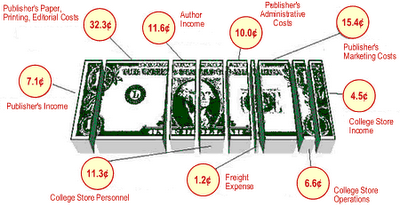 Nine hundred dollars can buy a lot of beer--or concert tickets or music downloads or ramen noodles--but for American college students, that's roughly how much they're spending on required textbooks each year. According to the government's General Accounting Office, the cost of such books has increased at twice the rate of inflation over the last two decades, while over the same period tuition has also outpaced inflation. Students find themselves with two options--not enrolling or not buying the books. But a two-year-old St. Paul-based company says they're coming to the aid of cash-strapped collegiates: they're offering free downloadable books to students; and all young scholars have to do is offer up a little data on buying preferences and endure a few dozen ads in the books. Win-win, right?
Nine hundred dollars can buy a lot of beer--or concert tickets or music downloads or ramen noodles--but for American college students, that's roughly how much they're spending on required textbooks each year. According to the government's General Accounting Office, the cost of such books has increased at twice the rate of inflation over the last two decades, while over the same period tuition has also outpaced inflation. Students find themselves with two options--not enrolling or not buying the books. But a two-year-old St. Paul-based company says they're coming to the aid of cash-strapped collegiates: they're offering free downloadable books to students; and all young scholars have to do is offer up a little data on buying preferences and endure a few dozen ads in the books. Win-win, right?To get free books from Freeload Press students must fill out a brief survey. The questions are fairly innocuous: "Which car would you most likely buy after graduating?," with a pulldown menu of options, from Acura to Scion. "What will be your first major purchase when you graduate?" (Options include car, home, jewelry, and electronics.) Once completed, they can choose from a dozen or so books, which are sprinkled with ads for Culver's, FedEx Kinko's, math tutoring software, and the like.) The company won't include ads for beer, tobacco or "edgy kinds of things," says Freeload Chief Operating Officer Howard Quinlan. Ads don't interfere with content, and only appear in natural breaks in the editorial material--endplates and chapter breaks--a decision that came after discussion with students and textbook authors.
So far, Freeload offers books mainly in business-related fields (accounting, economics, math), and Quinlan admits that's because marketing is already part of the vocabulary of such fields. He adds, "Perhaps, if you got into the social sciences, maybe there'd be less acceptance." (The New York Times suggests that the acceptance, which it says is low already, might be tied to a name that "conjures an image of party crashers cadging free beer, not a publishing concern striving for the highest intellectual standards.")
Quinlan admits that there's a quid pro quo: students, "the most over-sampled demographic in America," know that they're being marketed to, but, he says, many of them will support the advertisers in gratitude for making the books available. "Really, there's no punches pulled; it's exactly as you see it and the advertisers that promote this really has a lot of wind in their sales in regard to goodwill."
Freeload doesn't sell student-submitted data, Quinlan promises, and the ads are "limited and tasteful." During a recent visit to the University of Houston Business School, he says he saw a Starbuck's in the student union and corporate ads. "The whole environment today is so significantly different that advertising is a part of this demographic's world. They've been surveyed to death, but if they didn't like it, why would they go out of their way to write a five- or six-sentence pithy response thanking us?"
Quinlan knows that "there's always going to be some people who think that [advertising in textbooks] is going to be sacred territority." One such person is John Schott, a professor of cinema and media studies at Carleton College in Northfield, MN. He sees efforts like Freeload's as akin to getting branded products in high school lunch rooms and bathroom walls. Schott says he's not naive enough to call for an ad-free world, but "The real question is where do we draw lines? For me, there aren’t really clear principles about how to do it. It’s a matter of taste, a matter of aesthetics, and a desire to create a culture that has spaces free from advertising.”
Such places are few and far between, as ads appear on cellphone screens, blimps hovering over the Metrodome, foreheads (and other tattooed body parts), signs held by the homeless, answering machines (damn you, Samuel L. Jackson!), and just about every surface of our urban environments. While somewhat ambivalent about Freeload Press' endeavor, Schott worries about the precedent. “It’s the foot in the door idea. It’s not unlike advertising before the movies. It used to be there would be one Coke ad before movies--and I'd complain to management each time. But, lo and behold, now you have advertising for five or eight or in some cases 10 minutes," he says.
"Every visual experience is going to eventually be associated with some kind of brand message," Schott adds. "I think it’s important to say we value spaces that are free of that. Especially when you look at the new locative media technologies that are being developed--billboards that ring your cellphone when you walk by, for instance--unless controlled, they can get very virulent. This invasion of advertising messages in our society is in a very incipient stage and it’ll be much more invasive in five, which is a reason to have a debate now and ask ourselves where we draw the lines."
[Cross-posted at Minnesota Monitor. Image credit.]
No comments:
Post a Comment